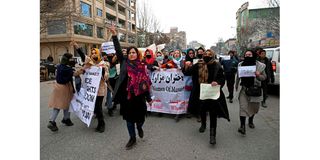G7 demands lifting of ban on working Afghan women

Afghan women chant slogans and hold banners during a women's rights protest march in Kabul on January 16, 2022.G7 foreign ministers on Tuesday demanded Taliban’s lifting of the ban on Afghan women working for non-governmental organisations and international aid agencies.
What you need to know:
- The UN has been negotiating with the Taliban to make exceptions to their edict, which prohibits women from working.
- It has been clinging to a small number of exceptions that allow women to work in specific circumstances in health, education and nutrition.
G7 foreign ministers on Tuesday demanded Taliban’s lifting of the ban on Afghan women working for non-governmental organisations (NGOs) and international aid agencies.
“We call for the immediate reversal of unacceptable decisions restricting human rights and fundamental freedoms, including the latest bans prohibiting Afghan women from working for NGOs and the United Nations (UN),” they said in a statement following a two-day meeting in Japan.
Their statement coincided with warnings from UN officials, who, according to The Guardian, said they may leave Afghanistan in May if the Taliban does not allow local women to work. However, the Taliban has rejected the call, saying foreign countries should not interfere in its internal affairs.
“The values and laws that are being enforced or implemented in Afghanistan are matters concerning Afghans only and have nothing to do with other countries,” Taliban government spokesman Zabihullah Mujahid said in a statement.
The UN has been negotiating with the Taliban to make exceptions to their edict, which prohibits women from working, and been clinging to a small number of exceptions that allow women to work in specific circumstances in health, education and nutrition. Other aid agencies in the complex environment have since opted to suspend their operations altogether.
Violation of rights
The G7's demand for the lifting of the ban reflects the concern of the international community about discrimination and violation of women’s rights. However, the Taliban's rejection of foreign interference suggests that a resolution to the issue may not be forthcoming.
The head of the UN Development Programme (UNDP), Achim Steiner described the situation as a being critical since negotiations with the Taliban have so far been unsuccessful in reversing the December edict.
“Obviously our hope and expectation is that there will be some common sense prevailing,” he told the Guardian.
The decision by aid agencies to leave Afghanistan according to crisis groups, is likely to disproportionately affect girls and women because they remain as most vulnerable to malnutrition and disease.
The Taliban, who came to power in 2021, have enforced various limitations on women based on their interpretation of Islam. These restrictions include banning them from pursuing higher education and job opportunities.





